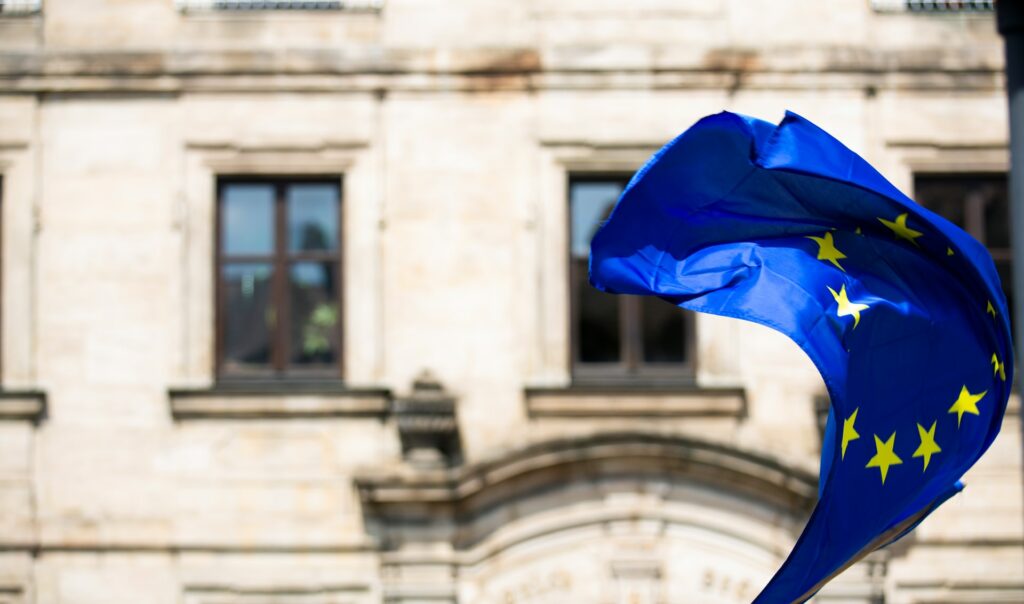After centuries of conflict and the atrocities of the Second World War with its millions of deaths and concentration camps, a few enlightened Europeans, including Jean Monnet, succeeded in convincing politicians to build and develop a European community that became the European Union. The simple idea, which is still valid today, is to resolve conflicts peacefully, and that we are more effective together than alone, whether at the World Trade Organisation, in supporting research programmes or in negotiating agreements with other countries or economic areas. Delegations of power at European level are freely agreed. The people have a voice and a power of co-decision through the election of the European Parliament by universal suffrage.
The common European interest is sought, proposed and safeguarded by the European Commission and the law is respected by all with the vigilance of the European Court of Justice.
This Europe is the envy of the world and many countries regularly express their desire to join this haven of peace and wealth.
They dream of an independent judiciary, of benefiting from structural policies such as the Common Agricultural Policy, the European Regional Development Fund, the European Social Fund favouring the least developed countries and the possibility of breaking out of nationalist shackles while respecting the European motto: United in diversity.
Europe since the Treaty of Paris on the ECSC (European Coal and Steel Community) in 1951 and the Treaties of Rome on the European Communities in 1957 has changed and developed a lot.
Lucidity dictates that, paradoxically, Europe's enthusiasm, with the exception of the period around the creation of the internal market in 1993 under the presidency of Jacques Delors, is not there, whereas we are living in a key period where our fundamental values may be called into question. The no vote in the 2005 referendum on the Constitutional Treaty in France and the Netherlands is an illustration of this. The result of the 2016 referendum in the UK which gave the Yes vote to Brexit by 51.9% is another. This is the first time that the continuous movement of enlargement has been stopped. This is a major setback for the European project, as the UK is a country that counts in Europe. The Mexican daily El Universal summarises the situation well in an editorial. "The member countries of the European Union are a reference for the Western world for the advances they have made in terms of welfare, human rights and quality of life. The newspaper regrets that the victory of the pro-Brexit camp threatens the construction of Europe and makes "one of the most successful models of integration falter, in this contemporary multipolar world where the construction of blocs is an attempt to consolidate common interests". How did it come to this?
Each country has its own history, culture, traditions and specificities.
The British state of mind is particular and deeply rooted: that of islanders who consider Europe to be the continent.
This country has a prestigious past. It was the first world military, industrial, commercial and economic power. It dominated the seas from the middle of the 18th century with an impressive military and commercial fleet, which enabled it to avoid invasions and limit the consequences of economic blockades. It benefited from being the location of the first industrial revolution. Thomas Newcomen invented the steam engine in 1705, the mechanical weaving machine came into being in 1769 and in 1804 the first attempt was made to build a steam locomotive. The pound sterling became the international currency in the 19th century. Politically, in foreign relations, it was always simple to avoid another country dominating Europe: whether Spain, France, Austria, Prussia or Russia.
The British Empire at its peak in 1922 had 400 million people, a quarter of the world's population and about 22% of the world's land mass.
The UK managed not to be invaded by either Napoleon or Hitler and was one of the great victors of the Second World War in 1945, to whom we are all indebted, but the country at that time was exhausted, almost bankrupt, losing part of its empire as it went along, seeing its power on an international scale diminished, culminating in the fiasco of the Suez expedition in 1956.
From now on, before the Chinese awakening, the USA and the USSR alone dominate the world and Germany is gradually becoming a major economic power again.
Three British characteristics shed light on the UK's relationship with Europe from 1946 onwards. The belief in the superiority of free trade, the rejection of protectionism and industrial policies. The special relationship with the USA. Pragmatism.
The UK did not believe at all in the success of the ECSC in 1951 and did not appreciate the reintegration of Germany. Following the creation of the EEC in 1957, it launched the EFTA in 1960, which included six other countries: Denmark, Norway, Switzerland, Portugal, Austria and Sweden, but as the EEC was an economic success, it applied for membership of the EEC on 9 August 1961. For Jean Monnet: "the British respect the facts. If they want to join the common market, it is because we have succeeded. Membership was delayed by the two vetoes of General de Gaulle in January 1963 and November 1967. President Georges Pompidou, a more Anglophile, unblocked the situation and allowed accession on 1 January 1973. A referendum in the UK in June 1975 resulted in a yes vote of 67.2% for remaining in Europe. Ambiguities remained as the UK was reluctant to see Europe allow Germany to become a normal and economically strong power again, and to see Europe as much more than a free trade area. It is not in favour of the various European institutions and deplores the common solidarity policies financed from the European budget.
It should be noted that the two major Conservative and Labour parties will never be unanimous on Europe and that their positions will evolve over time. Margaret Thatcher, a Conservative, was initially pro-European, but once in power she asked for a rebate on the European budget in November 1979 and obtained it at the Fontainebleau summit in May 1984. She systematically opposed any federal development of Europe and obtained an opt-out from the Maastricht Treaty in February 1992 to avoid joining the single currency. She also did not sign the Schengen Agreement on the free movement of goods and people in 1985. In 1988, she gave her Bruges speech which enshrined her vision of a Europe of nation states. In 2004, with Tony Blair, the Labour Prime Minister, who presented himself as a friend of Europe, the enlargement of Europe to 10 new countries was strongly encouraged. The aim is twofold: to integrate Central and Eastern European countries and to remove obstacles to EU integration. The country will also do its utmost to block any defence and security policy. The constant concern to appear as the privileged partner of the United States, the absolute loyalty to NATO and the support for the Gulf War. During the economic crisis, David Cameron, the Conservative Prime Minister, rejected a budgetary treaty in 2011, which he said would have damaged the City.
British pragmatism, that other characteristic, works wonders in the Brussels institutions. Lobbying is carried out with brio, skill and professionalism. The UK is taking advantage of the enlargements which impose the English language to the detriment of French, which was exotic for the new entrants, with the exception of Romania. It promotes its model of thought and expression, which is clear, precise and direct, and provides itself with effective means of monitoring. It tries to place its men or women at all relevant levels in the European Commission's directorates general with the aim of protecting the City, its financial institutions, its insurance companies, its model of thinking. Unfortunately for her, a domestic political manoeuvre by Prime Minister Cameron will undermine all her successes with the Brexit referendum. He thought he would get a no vote, he got a yes vote. The UK shot itself in the foot.
This result was unexpected. Most of the reports from employers, trade unions, research centres including universities, the Bank of England and chambers of commerce explained that voting for Brexit would be a mistake. A powerful anti-European conspiracy has managed to set itself up. It benefits from the support of the vast majority of the popular press, the leader of UKIP (UK Independence Party), brilliant speaker Nigel Farage, numerous social networks, some of which benefit from significant technical and financial support from the United States or Russia, and opportunistic conservatives seeking power, Boris Johnson being the typical example, who join the historical eurosceptics loyal to the Thatcher line. They are surfing on a deep anti-elite, anti-knowledgeable feeling of the working classes, on the feelings of abandonment within rural or formerly industrial regions, on the budgetary and social disengagement of public services, on the hostility of fishermen, on the weakened pensions and the general feeling of decline. The future is seen as more bleak, especially for his children. The nostalgia for the glorious past, for the Empire, is magnified by the popular press, which is very well distributed. It does not go into detail, no nuances, misleading headlines: Europe is systematically presented as the misfortune, the renunciation of national interest, the takeover by European technocrats and foreigners. Migrants are said to be guilty of invasion, replacement, undue takeover of jobs, even white and Catholic Poles are targeted.
What do we find?
The vote and then the polls since then indicate that the deep divide in the country has not disappeared. Brexit has the support of the countryside, the suburbs, the working class, the low educated and the elderly, England and Wales. Remain: the cities, including London, people
educated, many of the leaders of large companies, Scotland, Northern Ireland, young people.
In London, there were huge demonstrations across the country with thousands of European flags.
There has been no domino effect, on the contrary, Brexit still appears to other member states as a repulsor. Their public opinion is not in favour of it. In particular, they do not want to lose European funding. There is also a better perception of Europe by European citizens.
Significant advances unthinkable with the presence of the UK are taking place, such as the exceptional 750 billion recovery plan decided on 21 July 2020 by the heads of state and government to overcome the crisis of the covid...
The other expected difficulties are there, despite the post-Brexit agreement: the UK does not seem to want to respect its commitments on Northern Ireland and a test of strength is underway with Europe.
British companies, especially SMEs exporting to the EU, are suffering from the cost of customs formalities. The London financial centre is weakened. Scotland, which wants to remain in the European single market, wants a new referendum on leaving the UK.
Politically, Keir Starmer, the pro-European Labour leader, replaced Jeremy Corbyn, who had campaigned very half-heartedly during the referendum.
Prime Minister Boris Johnson remains as unpredictable as ever. He emphasises global Britain, the importance of the Indo-Pacific region and the increase in the number of nuclear warheads. He wants to give a pledge to President Biden, but the latter has not forgotten that he supported Trump. However, it will still take time to judge with the necessary hindsight the real situation of the UK, its positioning, its influence at the international level and to evaluate the state of its economy.
It is to be hoped and encouraged that British opinion will mature to favour the UK's return to the European Union in due course, with the ambition of helping the emergence of a true European power.
YUST ACADEMY NEWSLETTER No. 6 June 2021





